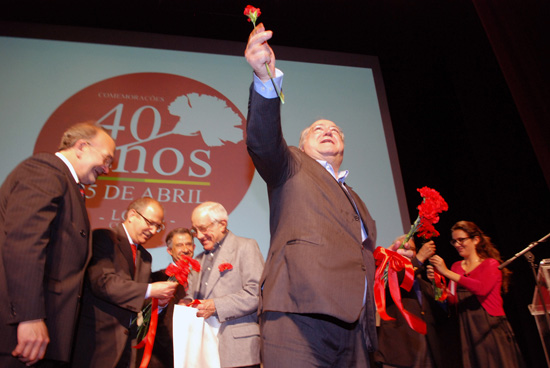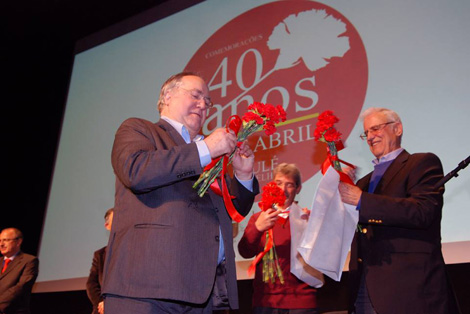 A real flood marked the launch of the 40th anniversary of the 25th of April in Loulé, last Saturday. The Cine-Teatro Louletano was small to receive all those who wanted to hear the military of Abril Otelo Saraiva de Carvalho, Vasco Lourenço and Martins Guerreiro and the participation was such that the organization ended up projecting the filming of what was happening inside the room abroad. , so as not to disappoint the expectations of those who no longer found a place indoors.
A real flood marked the launch of the 40th anniversary of the 25th of April in Loulé, last Saturday. The Cine-Teatro Louletano was small to receive all those who wanted to hear the military of Abril Otelo Saraiva de Carvalho, Vasco Lourenço and Martins Guerreiro and the participation was such that the organization ended up projecting the filming of what was happening inside the room abroad. , so as not to disappoint the expectations of those who no longer found a place indoors.
The conference took place a day before the 40th anniversary of the failed coup attempt on March 16, which became known as the "Levante das Caldas" and which, despite not having been successful, was an important moment for the path of the events of the 25th of April 1974, in the eyes of the guests.
At the conference/debate, promoted by a council commission and moderated by the rector of the University of Algarve António Branco, three of the protagonists of the Carnation Revolution spoke about the revolutionary process, showing, as expected, different views of what happened in 1974 .
 Still, the three guests were unanimous in addressing the present and the need for the people to intervene. “A new April 25 is needed, but the April Military are no longer able to do it. It has to be the people to do it», said the president of the Association 25 de Abril Vasco Lourenço.
Still, the three guests were unanimous in addressing the present and the need for the people to intervene. “A new April 25 is needed, but the April Military are no longer able to do it. It has to be the people to do it», said the president of the Association 25 de Abril Vasco Lourenço.
One of the most anticipated interventions of the night was that of Otelo Saraiva de Carvalho, a controversial post-April 25 figure, one of the key figures of the 25 November and accused of leading the FP-25 terrorist movement thereafter.
Unhappy with the direction the country has taken, Otelo Saraiva de Carvalho said that “a historic opportunity to change the political regime in which we live was lost”. For this soldier, "the strong pressure that the United States and the Western world exerted", with the threat of an economic boycott, if the socialist revolution continued, led to this regime.
“A regime that doesn't work because I don't see the people's capacity to intervene. (…) During the PREC, the people had power, there was intelligence and dynamism shown on the ground by the workers, hope of taking another political path, that of participatory democracy”, said the soldier.
 Vasco Lourenço had a more moderate intervention, but he even agreed with Otelo de Saraiva on some points. "We missed a great opportunity to combine representative democracy with direct democracy of grassroots organizations that are on the ground, but existing forces made it impossible for this reality to be materialized," he considered.
Vasco Lourenço had a more moderate intervention, but he even agreed with Otelo de Saraiva on some points. "We missed a great opportunity to combine representative democracy with direct democracy of grassroots organizations that are on the ground, but existing forces made it impossible for this reality to be materialized," he considered.
On the other hand, he blamed the political parties for the state the country had reached, as they "boycotted that connection, as they only wanted a representative democracy." However, unlike Othello, the president of the 25 de Abril Association believes that if there had been no 25 de Novembro, the country would have fallen into a dictatorship.
But, he believes, even without having achieved everything that was intended, the 25th of April changed things for the better, said Vasco Lourenço, considering it "inconceivable" to think that the country and the Portuguese were better before the Carnation revolution.
Martins Guerreiro, in turn, praised the Loulé initiative of giving such prominence to the commemorations of the 40th anniversary of the 25th of April. «This power is ashamed of the 25th of April. What Loulé is doing from below is very significant. The strength of local power and grassroots democracy is extremely important,” he stressed.
If during the Dictatorship Portugal lived a "war of arms", for Martins Guerreiro today there is a "financial war". “The element of subjugation that crushes the middle class today is debt. The Portuguese must join forces to fight speculative finance capital. This financial power is not democratic and it is necessary to democratically control the institutions of that power. (…) The Portuguese people have to take their destiny in their hands and affirm that they have as much dignity as the others», he defended.


















Comments